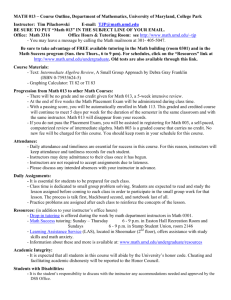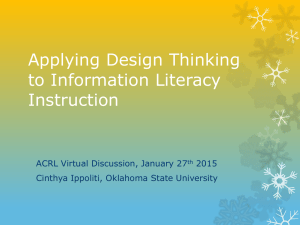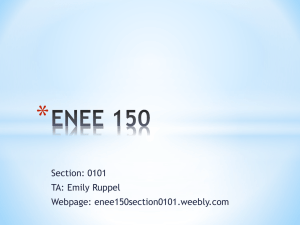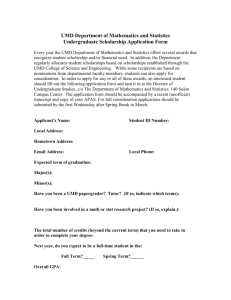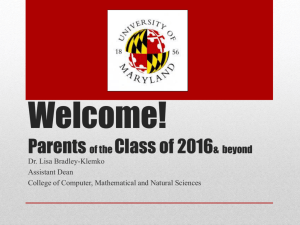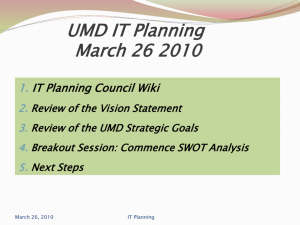enes115-syllabus-2011
advertisement
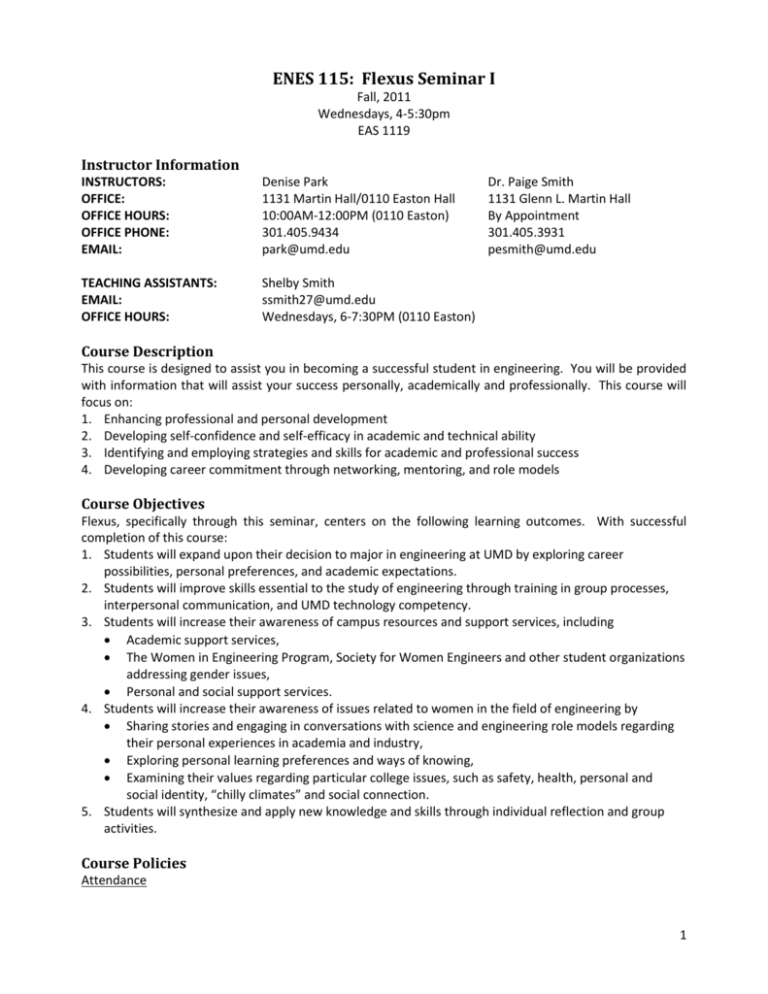
ENES 115: Flexus Seminar I Fall, 2011 Wednesdays, 4-5:30pm EAS 1119 Instructor Information INSTRUCTORS: OFFICE: OFFICE HOURS: OFFICE PHONE: EMAIL: Denise Park 1131 Martin Hall/0110 Easton Hall 10:00AM-12:00PM (0110 Easton) 301.405.9434 park@umd.edu TEACHING ASSISTANTS: EMAIL: OFFICE HOURS: Shelby Smith ssmith27@umd.edu Wednesdays, 6-7:30PM (0110 Easton) Dr. Paige Smith 1131 Glenn L. Martin Hall By Appointment 301.405.3931 pesmith@umd.edu Course Description This course is designed to assist you in becoming a successful student in engineering. You will be provided with information that will assist your success personally, academically and professionally. This course will focus on: 1. Enhancing professional and personal development 2. Developing self-confidence and self-efficacy in academic and technical ability 3. Identifying and employing strategies and skills for academic and professional success 4. Developing career commitment through networking, mentoring, and role models Course Objectives Flexus, specifically through this seminar, centers on the following learning outcomes. With successful completion of this course: 1. Students will expand upon their decision to major in engineering at UMD by exploring career possibilities, personal preferences, and academic expectations. 2. Students will improve skills essential to the study of engineering through training in group processes, interpersonal communication, and UMD technology competency. 3. Students will increase their awareness of campus resources and support services, including Academic support services, The Women in Engineering Program, Society for Women Engineers and other student organizations addressing gender issues, Personal and social support services. 4. Students will increase their awareness of issues related to women in the field of engineering by Sharing stories and engaging in conversations with science and engineering role models regarding their personal experiences in academia and industry, Exploring personal learning preferences and ways of knowing, Examining their values regarding particular college issues, such as safety, health, personal and social identity, “chilly climates” and social connection. 5. Students will synthesize and apply new knowledge and skills through individual reflection and group activities. Course Policies Attendance 1 Regular attendance and participation in this class is the best way to grasp the concepts and principles being discussed. However, in the event that a class must be missed due to an illness, the policy in this class is as follows: 1. For every medically necessary absence from class (lecture, recitation, or lab), a reasonable effort should be made to notify the instructor in advance of the class. When returning to class, students must bring a note identifying the date of and reason for the absence, and acknowledging that the information in the note is accurate. 2. If a student is absent more than 3 time(s), the instructor may require documentation signed by a health care professional. 3. If a student is absent on days when tests are scheduled or papers are due [or other such events as specified in the syllabus] he or she is required to notify the instructor in advance, and upon returning to class, bring documentation of the illness, signed by a health care professional. Missed/Late Assignments Students are expected to turn in all assignments, journals, papers and projects at the beginning of the class on the date due or it will be considered late. If you plan to miss a class, it is your responsibility to turn in the assignment before the class in person (i.e., during office hours or an alternate arranged time). There will be a 10% point deduction from the assignment for each day it is late. Academic Integrity The University of Maryland has a nationally recognized Honor Code, administered by the Student Honor Council. This code sets standards for academic integrity for all undergraduate and graduate students, and you are responsible for upholding these standards in this course. It is very important for you to be aware of the consequences for cheating, fabrication, facilitation, and plagiarism. For more information visit: http://www.shc.umd.edu. Students who engage in academic dishonesty in this course will receive no points for the assignment, and will be reported to the Honor Council and Office of Judicial Programs for further action. There will be no warnings. Remember, it is never worth it! Religious Observances Absence due to religious observance will not be penalized. However, it is the student’s responsibility to notify the instructors within the first three weeks of class regarding any absence(s) for the entire semester. Persons With Disabilities Students with a documented disability should inform the instructors as soon as possible if academic accommodations are needed. Accommodations for individuals with disabilities can be arranged through the Disability Support Service (DSS), a division of the University Counseling Center. Please call 301.314.7682, e-mail dissup@umd.edu, or visit Susquehanna Hall for more information. Multicultural Statement The instructors of this course are committed to creating an open and accepting environment in which diversity, opinions, unique perspectives, and others’ worldviews are respected. Special Accommodations Any student with special needs or circumstances (work conflicts with outside activities, personal issues, etc.) should feel free to meet with the course instructors during office hours to discuss accommodations and/or special circumstances. 2 Evaluation Process A total of 1000 points will be allocated as follows: Coursework First Look Fair Strong Interest Inventory Goal Statements Four-Year Plan Career Interest Paper Service Outreach Maximum Points 50 points 50 points 50 points 100 points 100 points 150 points Total Possible 50 points 50 points 50 points 100 points 100 points 150 points (EC of 25 points)* Professional Society Meetings 2 @ 75 points 150 points 4 @ 25 points 100 points Journal Entries Final Clark School Presentation 150 points 150 points 100 points 100 points Participation/Professionalism TOTAL POINTS POSSIBLE -1000 points *Extra Credit (EC) of up to 25 points will be awarded for participating in service outreach for more than 4 hours. Grading Scale In order to pass this class, all assignments must be completed. The following grading scale will be used: 900 – >1000 A 800 – 899 B 700 – 799 C 600 – 699 D <599 F Evaluation Criteria Strong Interest Inventory The Strong Interest Inventory is a career interest assessment that will be distributed in class. It is to be completed at home, and is due in class on Wednesday, September 21st. Goal Statements You will develop short term, long term, and career goal statements during the in-class activity to turn in. First Look Fair Involvement in student organizations is an important aspect of being a well-rounded UMD student. You are to attend the First Look Fair which will be held on Wednesday, September 14th and Thursday, September 15th from 10 am - 3 pm on McKeldin Mall. Visit at least five student organizations that are of interest, and record the name of the organization and contact information to turn in. Career Interest/Strong Interest Inventory Reaction Paper This is a paper based on your Strong Interest Inventory results and interpretation as discussed in class. The purpose of this paper is to apply your results and interpretation to your personal career exploration and development. First, discuss your current career goals. Second, discuss your results and interpretation of the Strong and how well you think it matches your career goals. Include all of the following: the area of engineering in which you are interested and why; based on what you know about yourself, describe your ideal job; if you 3 plan to continue your education after your bachelor’s degree and why; if there any other options you are considering; what opportunities you can take advantage of in the Clark School to help you achieve your goals; what obstacles you might face in reaching your goals and how you can prepare yourself to deal with these obstacles; and what is likely to change about these goals over the next few years. Length: 2-3 pages. Four-Year Plan Completing a four-year plan encourages graduating on time, assists in class scheduling and is important in keeping students on track. Following our class session with an academic advisor, you will complete your four-year plan template at home and turn in during the next class. **Print out and bring your unofficial transcript (found on Testudo under “Records and Registration”) and your major’s Four Year Plan template (found at www.eng.umd.edu/advising/ under “Degree Planning Tools” and “Four Year Plan”) to class on October 19th.** Professional Society Meetings As a follow-up to the First Look Fair and continuous encouragement of student involvement, you are required to attend two Engineering Professional Society meetings by November 30, 2011. One meeting must be a diversity-based organization or a general organization (i.e., Society of Women Engineers (SWE) or Engineers Without Borders), and one meeting must be a major-based organization (i.e.: American Society of Mechanical Engineers or Biological Resources Engineering Society). You will hand in a short paragraph describing each meeting (for a total of two paragraphs) which is to include: the name of the organization, the date/time/location of the meeting, issues discussed, and your personal reaction to the meeting. **Please note that it is easier to attend these earlier in the semester when many groups hold welcome meetings or picnics for new members and freshmen. Look for meeting announcements in hallways, on ENGR FYI, WIE FYI and the Clark School Calendar (www.eng.umd.edu). Journal Entries Journals are an expression of your feelings and reactions to academic and social experiences. You will be required to submit four journal entries electronically on Blackboard. Each journal is due by 4pm on Wednesdays, and specific topics will be posted on Blackboard the week before they are due. Length: approximately one page double-spaced. Service Outreach Service outreach is part of the “beyond the classroom” experience necessary to develop well-rounded engineering students. Mentoring and role modeling experiences have been shown to enhance selfconfidence and self-efficacy with respect to engineering. You are required to attend one service outreach activity at any time throughout the semester. Two opportunities through WIE are: 1. Girl Scout Engineering Saturday – Saturday, October 8, 2011, 9:00 am – 1:30 pm 2. Keys To Empowering Youth (KEYS) – Saturday, November 12, 2011, 9:00 am – 3:00 pm. Please let Elizabeth Remmers know if you are planning to volunteer for one of the events above and state that you are in Flexus as soon as possible at eremmers@umd.edu. Note: there are limited openings for Flexus volunteers, and all volunteers for these activities are expected to have an interest in working with a middle school age-group, be enthusiastic and make sure the students are engaged. Other opportunities not offered through WIE may be found at: http://www.csl.umd.edu/resources/ UMserves/index.htm. Please note that the service outreach activity you choose must relate in some way to engineering! 4 With 4 hours of service you will earn the full 150 points available; however, up to 25 extra credit points are possible if you serve for more than four hours. After attending the service outreach activity, you must email Denise with the name of the event, the coordinator’s name and email address, and the date and hours you worked. You will not be given credit for this assignment unless you email this information. This must be completed by November 16th, 2011. Final Clark School Presentation You will work in small groups (4-5 members) to present an overview of an engineering discipline or program. You and your group will choose a presentation topic and receive a presentation rubric on the second week of class. Your presentation should be presented with a Powerpoint and should be about 8-10 minutes long. You will also be graded on your presentation skills and your presentation aids (Powerpoint) as well as the following: If you present on an engineering discipline: What it is, what this type of engineer does Related job/career examples (i.e.: a typical day as a Civil Engineer, or the types of jobs this major can do) Interesting related facts or research If you present on an engineering program: Why is this program a good choice to pursue this type of engineering? What are some courses unique to this major that a student majoring in it should expect to take? What does this program have to offer that helps you excel in this type of engineering? (i.e.: related coursework, research labs, student groups, other related support) Participation/Professionalism 1. This course will be interactive, combining lecture, reading, discussion, and activities. Please come prepared to each class. Active participation is highly valued. Discussions of your personal experiences and opinions are important. You are encouraged to make suggestions about your needs as a first-year student, and to share ideas that you believe may make the class more conducive to your learning style. There will be periodic evaluations of the class content and you are strongly encouraged to comment honestly. 2. Professionalism entails coming to class on time, being attentive in class (vs. sleeping), completing individual assignments, and being respectful of your instructors, guest speakers, and other class members. Treating others with respect includes respecting diverse opinions, paying attention, listening when others are speaking, and allowing everyone a chance to voice opinions and comments. Confidentiality is expected as personal experiences and opinions will be shared often. Course Schedule Please note that this schedule is tentative and the instructors may alter it as needed. Any changes will be announced in class or via e-mail. Please check your email at least once a day! Week Date 1 8/31 Topic Assignment (Due for class) Syllabus Overview, Community Expectations and Guidelines, Entrance Survey (4-4:30) Crash Course in Physics (4:30-5:30) 5 2 9/7 Intro to MatLab and Excel (4-4:45) Journal #1 Introduction to Circuits (4:45-5:30) Meet in 1116 JMP (computer lab) 3 9/14* Goal Setting Exercise (4-4:45) Introduction to Basic Tools – Part I (4:45-5:30) Meet in 1116 JMP (computer lab) 4 9/21 Distribute Strong Interest Inventory All About Me – Diversity & Gender (4-4:45) First Look Fair Assignment Strong Interest Inventory ProE (4:45-5:30) 5 6 9/28 10/5 Meet in 1116 JMP “I’m A Maryland Student, Now What?” Dr. Marsha Guenzler-Stevens, Office of Campus Programs (4-4:45) Goal Statements Journal #2 Student Panel (4:45-5:30) Time & Stress Management Barbara Goldberg, Learning Assistance Services (4-4:45) Preliminary Reports & Presentations (5-5:30) 7 10/12* Meet in 1116 JMP Strong Interest Inventory Interpretation & ONET Career Session (4-4:45) Introduction to Basic Tools – Part II (4:45-5:30)* 6 Meet in 1116 JMP (computer lab) 8 10/19 9 10/26 10 11/2 11 11/9 12 11/16 13 14 15 11/23 11/30 12/7 **ENES 100 Midterm Review this week (outside of class)** Four-Year Plan, Schedule Planning, & Meet with an Advisor Nicole Hollywood, Engineering Advising & Academic Support Rising to Your Career Potential Heidi Sauber, Director, Engineering Co-Op Women Safety & Self-Defense Luke Lindberg, University of Maryland Networking Overview Dr. Paige Smith Networking Event Meet in 2460 AV Williams Kolb Learning Styles Dr. Paige Smith **Print out and bring your Unofficial Transcript and Four Year Plan template to class Four Year Plan Journal #3 Career Interest Paper Service Outreach QUEST Happy Thanksgiving! Presentations Final Presentations Presentations Professional Society Meetings Final Presentations Closing, Course Evaluations Journal #4 * Please wear closed-toe shoes with your hair tied back on 9/14 and 10/12 when we will be using tools in the workshop. This is a safety requirement for using the equipment. 7
